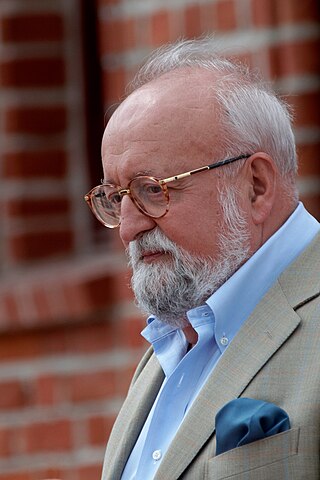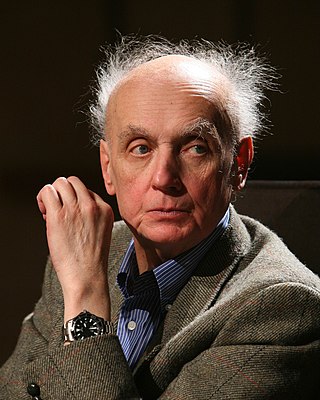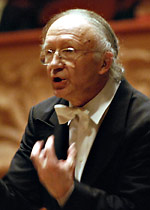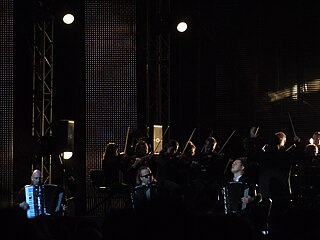Related Research Articles

Krzysztof Eugeniusz Penderecki was a Polish composer and conductor. His best-known works include Threnody to the Victims of Hiroshima, Symphony No. 3, his St Luke Passion, Polish Requiem, Anaklasis and Utrenja. His oeuvre includes five operas, eight symphonies and other orchestral pieces, a variety of instrumental concertos, choral settings of mainly religious texts, as well as chamber and instrumental works.

Wojciech Kilar was a Polish classical and film music composer. One of his greatest successes came with his score to Francis Ford Coppola's Bram Stoker's Dracula in 1992, which received the ASCAP Award and the nomination for the Saturn Award for Best Music. In 2003, he won the César Award for Best Film Music written for The Pianist, for which he also received a BAFTA nomination. In 2012, he became the recipient of Poland's highest distinction, the Order of the White Eagle.
Juan María Solare is an Argentine composer and pianist.

Heinz Robert Holliger is a Swiss composer, virtuoso oboist, and conductor. Celebrated for his versatility and technique, Holliger is among the most prominent oboists of his generation. His repertoire includes Baroque and Classical pieces, but he has regularly engaged in lesser known pieces of Romantic music, as well as his own compositions. He often performed contemporary works with his wife, the harpist Ursula Holliger. Many composers have written works for him, including Messiaen, Berio, Carter, Henze, Krenek, Lutosławski, Martin, Penderecki, Stockhausen and Yun. A noted composer himself, Hollinger has written works such as the opera Schneewittchen (1998).

Ewa Maria Podleś was a Polish coloratura contralto singer who had an active international career both on the opera stage and in recital. She was known for the agility of her voice and a vocal range which spanned more than three octaves. She excelled in Rossini roles such as Rosina in Il barbiere di Siviglia, the title role of La Cenerentola, Isabella in L'italiana in Algeri and the title role of Tancredi. She was able to perform roles that Handel had written for castratos, such as Rinaldo and Giulio Cesare. Podleś appeared on leading stages of the world and made many recordings.

Felicja Blumental was a Polish pianist and composer. "She was one of the relatively few women born in the first quarter of the twentieth century to have achieved an important career as a concert pianist."

Joel Fan is an American pianist and Steinway Artist "who has won praise for his technical expertise, lyrical playing, and outstanding interpretation". The New York Times has described Joel Fan as an "impressive pianist" with a "probing intellect and vivid imagination." "Fan has a flourishing international career as a performing and recording artist, notable for his fluency in the standard repertoire and contemporary works." Consistently acclaimed for his recitals and appearances with orchestras, Mr. Fan scored two consecutive Billboard Top 10 Debuts with his solo CDs World Keys and West of the Sun, while Dances for Piano and Orchestra earned a Grammy nomination.

Motion Trio is a Polish accordion trio founded in 1996 by Janusz Wojtarowicz.

Anaklasis is a composition for 42 string instruments and percussion, composed in 1960 by the Polish composer Krzysztof Penderecki. It was first performed at the Donaueschingen Festival in 1960. At this first performance, it was well received by the audience who demanded an encore.
Füsun Köksal is a Turkish composer of contemporary classical music.

Piotr Orzechowski, also known by his stage name Pianohooligan, is a Polish jazz pianist and composer. He is a graduate of the Berklee College of Music in Valencia and a winner of the Montreux Jazz Piano Competition and Jazz Hoeilaart, hailed by the critics as "the most creative and uncompromising young Polish jazz artist."

Mateusz Krzysztof Maksymilian Molęda is a German-Polish conductor.
The Sextet is a two-movement composition for clarinet, horn, violin, viola, cello, and piano by Polish composer Krzysztof Penderecki. The composition was written in 2000 and is, according to some critics, the composer's most substantial chamber work.
Utrenja, alternatively spelled as Utrenia, Utrenya, or Jutrznia, and sometimes also translated as Matins, is a set of two liturgical compositions by Polish composer Krzysztof Penderecki. They were composed and premiered in 1970 and 1971.

Mitología de las Aguas, or Mythology of the waters, is a composition for flute and guitar by the Cuban composer Leo Brouwer, written in 2009 for the German-Venezuelan guitarist and composer Sef Albertz.

Skylla and Charybdis is a 2014 composition for piano quartet by Graham Waterhouse, played in four movements without a break. The title refers to Scylla and Charybdis, two sea monsters from Greek mythology. In performances in German-speaking countries, it has also appeared in English surroundings as Between Scylla and Charybdis.
Maria Belooussova was a Russian pianist. She lived and worked in Paris.

Credo is a large-scale sacred composition for soloists, children's choir, mixed choir and orchestra by Krzysztof Penderecki, completed in 1998. It was commissioned by Helmuth Rilling for the Oregon Bach Festival, where it was first performed on 11 July 1998. Penderecki expanded the liturgical text by hymns and Bible verses in Latin, Polish and German. A recording won the 2000 Grammy Award for best choral performance.

The Symphony No. 2„Sinfonia concertante” is a symphony in three movements by Wojciech Kilar.
References
- 1 2 3 4 5 "Aufsehenerregender Erfolg von Maak & Albertz mit Weltpremiere von Pendereckis Musik - openPR". www.openpr.de (in German). Retrieved 2019-09-22.
- 1 2 ""Bach strahlt bis heute!" - Nachrichten aus der Region - Torgauer Zeitung". www.torgauerzeitung.com. Retrieved 2019-09-22.
- 1 2 3 "Solo Piano Work of Penderecki - World Premiere". HELLO STAGE. 2019-03-19. Retrieved 2019-09-22.
- 1 2 "Maak & Albertz mit "Resplendences..." und Uraufführung von Penderecki". Vienna News (in German). 2019-03-20. Retrieved 2019-09-22.
- ↑ "Three Pieces in Old Style". ninateka.pl. Retrieved 2019-09-22.
- ↑ "Sinfonietta per archi". ninateka.pl. Retrieved 2019-09-22.
- ↑ "MusicalAmerica - The pianist Anna-Maria Maak releases her new album with works by the composers Sef Albertz and Krzysztof Penderecki". www.musicalamerica.com. Retrieved 2021-09-21.
- 1 2 "Anna-Maria Maaks »In The Secret Of The World« jetzt im Handel -" (in German). 2021-09-19. Retrieved 2021-09-21.
- ↑ "MusicalAmerica - The pianist Anna-Maria Maak releases her new album with works by the composers Sef Albertz and Krzysztof Penderecki". www.musicalamerica.com. Retrieved 2021-09-21.
- ↑ Anna-Maria Maak, Sef Albertz – In the Secret of the World (2021, CD) , retrieved 2021-09-21
- ↑ "Pianistin Anna-Maria Maak mit neuem Album mit Werken von Sef Albertz und Krzysztof Penderecki - openPR". www.openpr.de (in German). Retrieved 2021-09-21.
- ↑ "In the Secret of the World (Album Preview)". SoundCloud. Retrieved 2021-09-21.
- ↑ Maak & Albertz | 'In the Secret of the World' | Teaser N° 4 , retrieved 2021-09-21